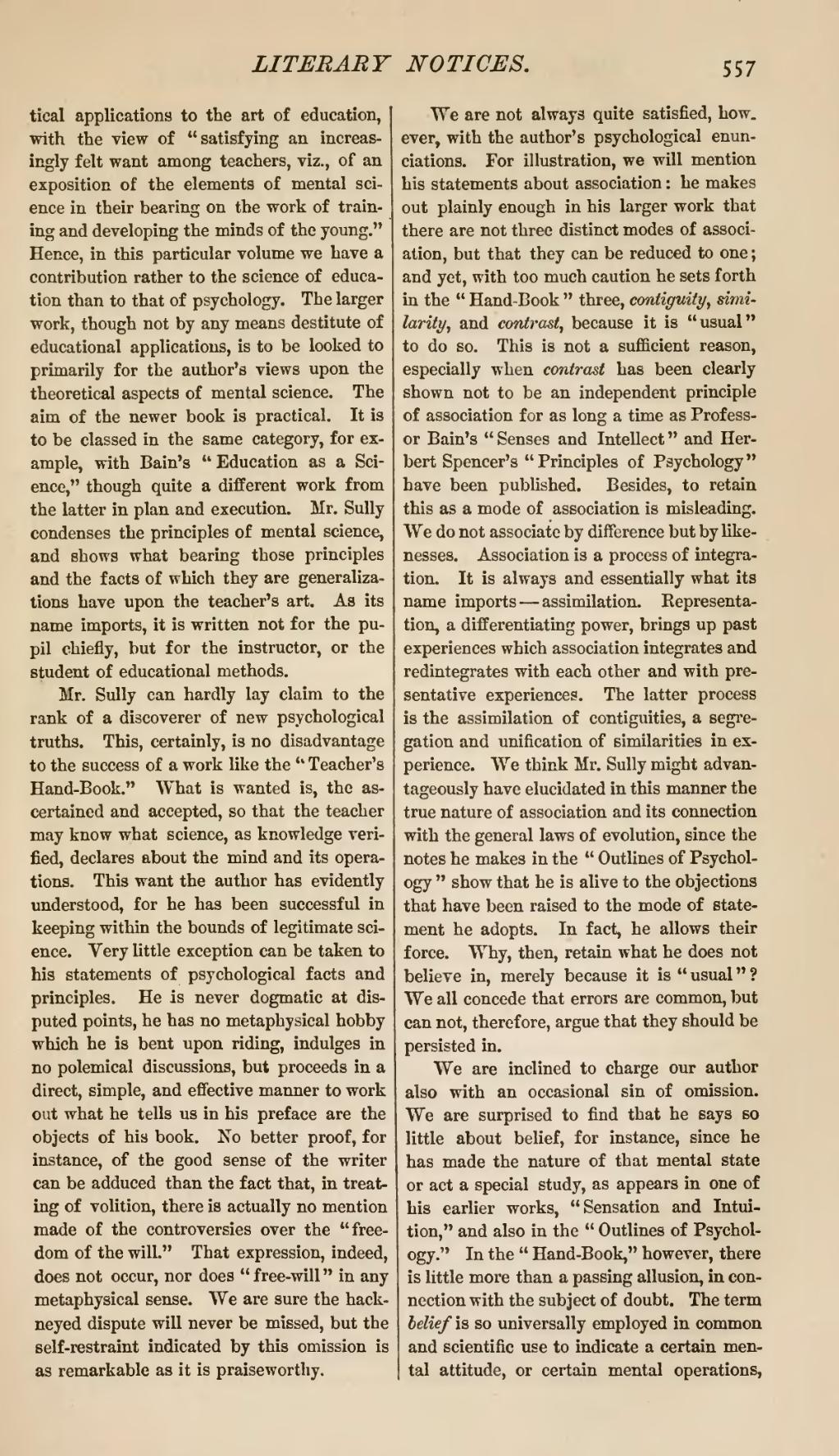tical applications to the art of education, with the view of "satisfying an increasingly felt want among teachers, viz., of an exposition of the elements of mental science in their bearing on the work of training and developing the minds of the young." Hence, in this particular volume we have a contribution rather to the science of education than to that of psychology. The larger work, though not by any means destitute of educational applications, is to be looked to primarily for the author's views upon the theoretical aspects of mental science. The aim of the newer book is practical. It is to be classed in the same category, for example, with Bain's "Education as a Science," though quite a different work from the latter in plan and execution. Mr. Sully condenses the principles of mental science, and shows what bearing those principles and the facts of which they are generalizations have upon the teacher's art. As its name imports, it is written not for the pupil chiefly, but for the instructor, or the student of educational methods.
Mr. Sully can hardly lay claim to the rank of a discoverer of new psychological truths. This, certainly, is no disadvantage to the success of a work like the "Teacher's Hand-Book." What is wanted is, the ascertained and accepted, so that the teacher may know what science, as knowledge verified, declares about the mind and its operations. This want the author has evidently understood, for he has been successful in keeping within the bounds of legitimate science. Very little exception can be taken to his statements of psychological facts and principles. He is never dogmatic at disputed points, he has no metaphysical hobby which he is bent upon riding, indulges in no polemical discussions, but proceeds in a direct, simple, and effective manner to work out what he tells us in his preface are the objects of his book. No better proof, for instance, of the good sense of the writer can be adduced than the fact that, in treating of volition, there is actually no mention made of the controversies over the "freedom of the will." That expression, indeed, does not occur, nor does "free-will" in any metaphysical sense. We are sure the hackneyed dispute will never be missed, but the self-restraint indicated by this omission is as remarkable as it is praiseworthy.
We are not always quite satisfied, how. ever, with the author's psychological enunciations. For illustration, we will mention his statements about association: he makes out plainly enough in his larger work that there are not three distinct modes of association, but that they can be reduced to one; and yet, with too much caution he sets forth in the "Hand-Book" three, contiguity, similarity, and contrast, because it is "usual" to do so. This is not a sufficient reason, especially when contrast has been clearly shown not to be an independent principle of association for as long a time as Professor Bain's "Senses and Intellect" and Herbert Spencer's "Principles of Psychology" have been published. Besides, to retain this as a mode of association is misleading. We do not associate by difference but by likenesses. Association is a process of integration. It is always and essentially what its name imports—assimilation. Representation, a differentiating power, brings up past experiences which association integrates and redintegrates with each other and with presentative experiences. The latter process is the assimilation of contiguities, a segregation and unification of similarities in experience. We think Mr. Sully might advantageously have elucidated in this manner the true nature of association and its connection with the general laws of evolution, since the notes he makes in the "Outlines of Psychology" show that he is alive to the objections that have been raised to the mode of statement he adopts. In fact, he allows their force. Why, then, retain what he does not believe in, merely because it is "usual"? We all concede that errors are common, but can not, therefore, argue that they should be persisted in.
We are inclined to charge our author also with an occasional sin of omission. We are surprised to find that he says so little about belief, for instance, since he has made the nature of that mental state or act a special study, as appears in one of his earlier works, "Sensation and Intuition," and also in the "Outlines of Psychology." In the "Hand-Book," however, there is little more than a passing allusion, in connection with the subject of doubt. The term belief is so universally employed in common and scientific use to indicate a certain mental attitude, or certain mental operations,

